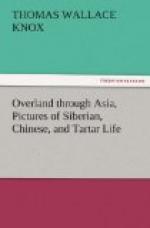There is much game on the steppe in summer, birds being more numerous than beasts. The only winter game we saw was the white partridge, (kurupatki,) of which we secured several specimens.
The steppe is fertile, and in everything the soil can produce the people are wealthy. They have wheat, rye, and oats in abundance, but pay little attention to garden vegetables. In 1866 the crops were small in all parts of Siberia west of Lake Baikal, and I frequently heard the peasants complaining of high prices. They said such a season was almost unprecedented. On the steppe oats were forty copecks, and wheat and rye seventy copecks a pood; equaling about thirty cents and seventy-five cents a bushel respectively. In some years wheat has been sold for ten copecks the pood, and other products at proportionate prices. We paid twelve copecks the dizaine for eggs, which frequently sell for one-third that sum.
The fertility of the soil cannot be turned to great account, as there is no general market. Men and horses engaged in the transportation and postal service create a limited demand, but there is little sale beyond this. With so small a market there are very few rich inhabitants on the steppe; and with edibles at a cheap rate, there are few cases of extreme poverty. We rarely saw beggars, and on the other hand we found nobody who was able to dress in broadcloth and fine linen and fare sumptuously every day.
Hay is abundant, and may be cut on any unclaimed part of the steppe. I was told that in some places the farmers of a village assemble on horseback at an appointed time. At a given signal all start for the haying spots, and the first arrival has the first choice. There is enough for all, and in ordinary seasons no grass less than knee high is considered worth cutting.
At the villages we generally obtained excellent bread of unbolted wheat flour, rye being rarely used. There were many windmills of clumsy construction, the wheels having but four wings, and the whole concern turning on a pivot to bring its face to the wind. No bolting apparatus has been introduced, and the machinery is of the simplest and most primitive character. It was a period of fasting, just before Christmas, and our whole obtainable bill of fare comprised bread and eggs. As we reached a certain station we asked what we could get to eat.
“Everything,” was the prompt reply of the smotretal. We were hungry, and this information was cheering.
“Give us some schee, if you please,” said the doctor.
An inquiry in the kitchen showed this edible to be ‘just out.’
“Some beef, then?”
There was no beef to be had. Cutlets were alike negatived.
“Any pilmania?” was our next inquiry.
“Nierte; nizniu.”




